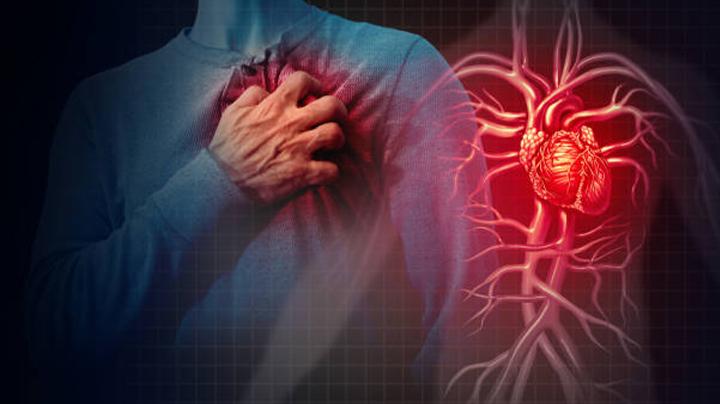Cardiac Arrest: Symptoms, Causes & Treatments

What Is Cardiac Arrest?
Cardiac arrest is a sudden loss of heart function triggered by irregular and erratic heart rhythms. When the heart stops, the breathing stops instantly, making the person lose consciousness and could be fatal. However, contrary to popular belief - heart attack and cardiac arrest are not the same and are two different health conditions.
While heart attacks can present with some warning signs and symptoms, the latter can happen instantly without leaving much time for treatment. In addition, in some instances, a severe heart attack can trigger a change in the heart's electrical activity, causing a cardiac arrest.
Cardiac arrest, heart failure, heart attack, or other heart conditions demand urgent medical and surgical intervention. Do not ignore typical signs of heart condition, including breathing difficulties, excessive sweating, pain, and weakness in the left arm. Seek immediate help. Remember, reaching out to emergency care right in time helps prevent an impending heart condition and helps in saving a life.
What Are The Symptoms of Cardiac Arrest?
Unlike a heart attack, a cardiac arrest is more like a 'silent killer' that doesn't present with any warning signs or symptoms. The signs are almost instant; in many cases, the heart function stops even before the patient makes a self-observation and alerts the family or friends around.
A few classic signs of cardiac arrest include sudden collapse, no breathing and pulse, and loss of consciousness. However, some patients might experience sudden discomfort in the chest, weakness on one side of the body, irregular heartbeat, dizziness, and wheezing, accompanied by flutters and palpitations, and shortness of breath.
If you notice any of the following symptoms, seek doctor’s help instantly. These signs can be intense, severe and aggressive and may leave a little chance to respond. Remember, every second counts.
- Sudden collapse
- Loss of pulse
- No breathing activity
- Loss of consciousness
- Intense discomfort and tightness in chest
- Shortness of breath
- Fatigue
- Fluttering and fast beating sensations in the heart
During cardiac arrest, the lack of heart activity blocks the supply of oxygen-rich blood to the body, leading to death or irreversible brain damage almost instantaneously.
Though treating a cardiac arrest patient is extremely time-sensitive, there are many cases where patients get resuscitated within the next few minutes, undergo subsequent treatment and continue to live healthy.
What Causes Cardiac Arrest?
Cardiac arrest is the most unpredictable heart condition; to know more about this, let us learn about the triggers. One of the chief cardiac arrest causes is fluctuations or disruptions in the electrical signals, which play a pivotal role in regulating the rate and rhythm of the heartbeat. When these electrical signals erode, the heart starts beating either faster or too slowly, often uncoordinated.
In medical language, an irregular heartbeat is termed an arrhythmia. While some arrhythmias are harmless and do not disrupt heart functions, other types can lead to cardiac arrest.
These sudden fluctuations in the heart's electrical activity disrupt and stop the heart's ability to pump blood, and the flow to other body parts gets stopped instantly. Patients with a history of various heart conditions, including Coronary Artery Disease, Heart Attack, Enlarged Heart, Heart Valve Disease, and Congenital Heart problems, are at risk of cardiac arrest.
Other risk factors include a family history of heart disease, uncontrolled high blood pressure, diabetes, sleep apnea, kidney disease, being overweight, sedentary lifestyle; stress can also lead to cardiac arrest.
Rare genetic disorders like Long QT Syndrome and Brugada Syndrome can cause irregular heartbeat. If you are diagnosed with the Long QT gene, talk to your cardiologist about ways to prevent the risk of cardiac arrest.
The Department of Cardiology at Gleneagles Hospital, Mumbai, helmed by renowned Cardiologists, Cardiothoracic Surgeons, and extensively trained paramedics, functions round-the-clock and is equipped with state-of-the-art infrastructure facilities to meet all kinds of cardiac emergencies.
How Is Cardiac Arrest Treated?
Time is an imperative factor in cardiac arrest treatment. Patients who receive instant treatment can survive a cardiac arrest. The chief treatment protocol of cardiac arrest treatment involves Cardiopulmonary Resuscitation or CPR, which can bring the heartbeat back and prevent death. Doctors would use an automated external defibrillator to rest the heart rhythm.
However, if you notice someone falling unconscious suddenly with a lack of breathing, rush for emergency medical help. One of the most recommended lifesaving methods by cardiologists as a part of cardiac arrest treatment plan till the patient reaches the hospital is providing hard chest compressions with palms, allowing the chest to rise between each contraction. Persistent, hard compressions aid in maintaining a rhythm and consistency till the proper medical help arrives.
Once the patient gets stabilized, medicines are administered to manage symptoms and irregular heartbeats and prevent another unpredictable cardiac event. Further treatment can include heart surgery or other cardiac procedures depending on the underlying condition.
Treatment For Cardiac Arrest:
Implantable Cardioverter Defibrillator (ICD) or a Pacemaker continuously monitors the heart rhythm. The device not only helps in noticing the irregular heartbeat but also triggers the shocks to reset the rhythm and prevent cardiac arrest.
Surgical Procedures To Treat Cardiac Arrest:
Coronary Angioplasty to clear clogged heart arteries.
Coronary Artery Bypass Surgery, or CABG, restores blood flow to the heart via a new pathway created around a blocked artery.
Radiofrequency Catheter ablation treats the block in the pathway of the heart signalling, by creating small scars in the heart with radiofrequency energy, preventing irregular heart signals.
Corrective Heart Surgery is an option for patients born with heart problems, diseased heart muscle, and heart valve disease.
How To Prevent Cardiac Arrest?
A cardiac arrest can be prevented by maintaining a healthy heart. Do the following to be hale and hearty.
- Eat nutritious food. Avoid fatty, processed foods. Instead, include fresh vegetables, fruits, and protein in your daily diet.
- If you are a smoker, quit right now.
- Keep your blood pressure, cholesterol, and diabetes under control.
- Workout or go for an hour walk daily to keep the heart healthy
- Take your doctor's appointment and regular medications.
- Get your annual check-up done with success.
- If you have a family history of cardiac arrest, get a periodical check-up.
Cardiac Services At Gleneagles Hospital, Mumbai:
The Cardiac Care Services provided at the Gleneagles hospital are extensive, unparalleled, and aligned with international standards in cardiac care. Talk to our renowned Cardiologists, Cardiothoracic surgeons, and other multidisciplinary experts for the best treatment options.
Conclusion:
Cardiac arrest is a sudden heart condition where the heartbeat stops abruptly, causing immediate death or irreversible damage to the brain. It can be fatal almost instantly if not intervened with aggressive and faster medical treatment.
Cardiac arrest doesn't present with any initial symptoms; however, if you notice uneasiness in the chest, discomfort, dizziness, or shortness of breath, ask for urgent medical help. Immediate CPR restores the heart rhythm; however, if the medical service is not reachable in the next few minutes, continue providing hard chest compressions with palms till you reach the hospital.
Equipped with cutting-edge medical services, the cardiac care services at Gleneagles Hospital provides seamless service to heart patients.











